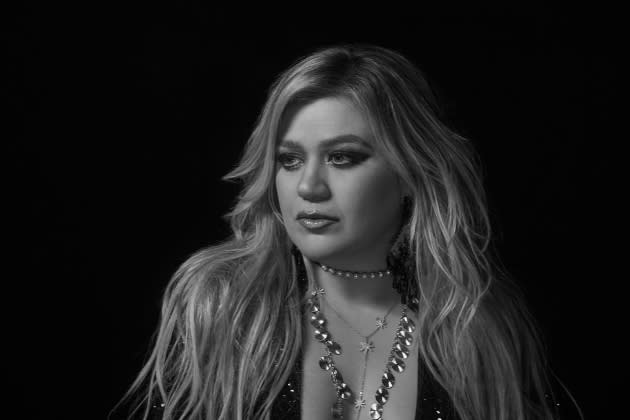Kelly Clarkson Turns the Messiness of Divorce into Showstopping Pop Spectacle on ‘Chemistry’
- Oops!Something went wrong.Please try again later.

In the midst of Kelly Clarkson’s divorce, she had a revelation. Contrary to the meaning of her 2015 ballad “Piece by Piece,” which praised her talent-manager ex-husband Brandon Blackstock for restoring her faith in men after her father deserted her as a child, the pop singer realized that no one could truly heal her but herself. “It’s almost too much to put on someone to do that for you, you have to do that yourself,” the pop singer admitted on her talk show in 2020. Said revelation appears on Clarkson’s wistful new song, “Rock Hudson,” amid a three-minute-series of jabs toward her ex when the singer not-so-subtly recalls the track dedicated to him and calmly declares, “By the way, piece by piece, I found out my hero’s me.”
For Clarkson, that’s just one of many realizations within her 10th studio album, Chemistry, on which she gives us her own scientific formula for recovering from divorce. It’s one that involves weed, eternal-sunshining her own mind, revenge fantasies, breaking down, hooking up, moving on, and finding herself again after grappling with the gossip and tabloid coverage of her public breakup. Clarkson’s healing journey isn’t linear or without its sharp edges — it’s a twisty roller coaster burning with grief, rage, and regret. After all, hell hath no fury like a pop star scorned.
More from Rolling Stone
Kelly Clarkson Unleashes Her Post-Divorce Anger on New Song 'Red Flag Collector'
Kelly Clarkson Goes Rock to Cover Red Hot Chili Peppers Single 'Can't Stop'
Kelly Clarkson, Foo Fighters, Lil Wayne to Bring the Hits at 2023 iHeartRadio Music Festival
Throughout Clarkson’s 14-song pop spectacle, she expels her angst by channeling the fierce alt-rock ethos of her 2007 breakup opus, My December — as well as swelling “Kellyoke” covers like Billie Eilish’s “Happier Than Ever” and Soundgarden’s “Black Hole Sun” — and the R&B through line of 2017’s Meaning of Life. But while the album is rife with cinematic choruses flanked by big guitar riffs, much of the record hinges on Clarkson’s emotive vocals and soul-baring lyrics, turning Chemistry into her most vulnerable project since My December.
Her pain is an omnipresent but fluctuating force on Chemistry. On opener “Skip This Part,” Clarkson attempts to harness it with a slow-burning doo-wop build-turned-soaring rock ballad that evokes the blistering “Happier Than Ever.” “I feel every break as I realize my fate/I succumb to the taste of betrayal/I try numbing the pain with my sweet mary jane/But I know this escape isn’t stable,” she growls. What follows is “Mine,” a wistful ditty that masks a plot for sweet vengeance. “I hope one day someone will take your heart and hold it tight/Make you feel like you’re invincible deep inside/And right when you think that it’s perfect they cross a line/And steal your shine/Like you did mine,” she bitterly pleas. Later, she uses sarcasm to tend to her wounds on the R&B-inflected “My Mistake,” and hurls her cynicism at rom-coms like The Notebook and It’s Complicated for their unrealistic portrayal of romance on “I Hate Love,” which features delicate banjo plucking by Steve Martin. Eventually, Clarkson’s mourning comes to the forefront with the ballad “Lighthouse,” where she’s haunted by her struggle to remain “sober,” an allusion to her 2007 alt-rock single about a metaphorical addiction to a toxic relationship.
But Clarkson “ain’t no damsel.” In between the not-so-subtle digs at her ex and explorations of palpable pain is Clarkson’s unwavering hope about the possibility of love and a journey of self-discovery. By the time the title track hits, there’s a shift in Clarkson’s attitude toward her romantic future. She’s slipped into a hazy daydream about falling for someone again. That sentiment persists with standouts like the breezy Carly Rae Jepsen-co-write “Favorite Kind of a High” and the effervescent “Magic,” which features a Taylor Swiftian talk-singing bridge, and sees Clarkson grappling with the anxiety and anticipation of a new relationship. “I’m in your space, but I tread so carefully,” her voice trembles.
But the theme of the record is Clarkson’s own personal growth, and she harnesses the unshakable confidence of “Miss Independent” and “Since U Been Gone” on a series of empowerment anthems primed to become instant classics: “High Road,” an Eighties-tinged power ballad underpinned by the exploding catharsis from her gritty belt; the swaggery “Down to You,” where her towering vocals shine; and the sticky earworm “Rock Hudson.”
Toward the end of her album, Clarkson admirably plays with a more left-of-center sound on “Red Flag Collector,” a Wild West-duel diss track aimed at her ex, and Latin-horn-flanked closer “That’s Right.” But Clarkson is at her strongest when she’s sticking to grunge guitars and power-pop anthems. Luckily, Chemistry is full of them and shows Clarkson — raw, unfiltered, and exorcizing her demons — is an artist at the top of her game.
Best of Rolling Stone
